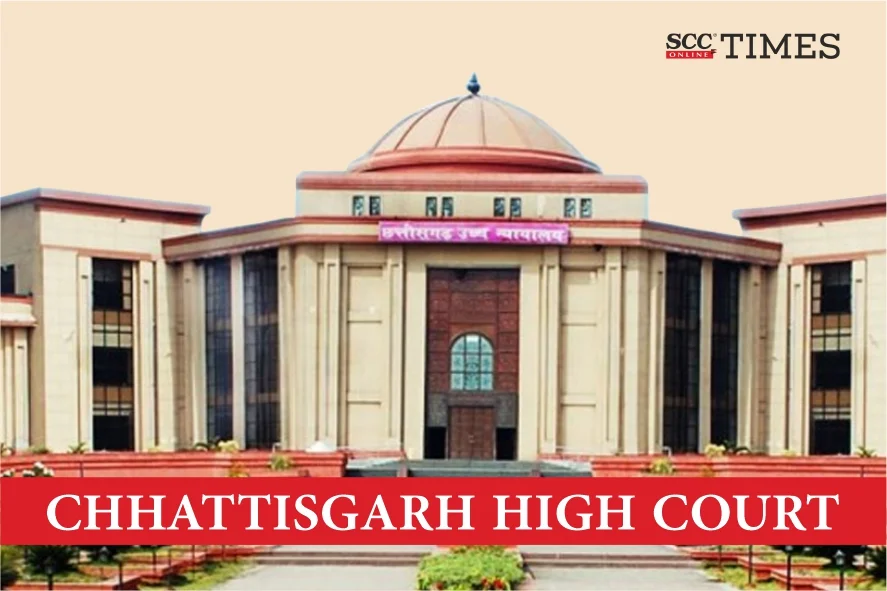Chhattisgarh High Court: In a criminal appeal filed by a man who was convicted under Section 497 of the Penal Code ,1860 (‘IPC’) in a false promise to marry case, , a Single Judge Bench of Arvind Kumar Verma, J., allowed the appeal, holding that since the aggrieved party, i.e., the husband of the complainant, did not file a complaint of adultery, the ingredients of Section 497 of the IPC have not been made out against the convict.
Background
In 2015, the complainant lodged a report against the convict alleging that six years ago, they secretly got married on the pretext that when the complainant’s younger sister got married, the convict would marry her again by following proper rituals and customs. She alleged that even after five years of their marriage, the convict used to avoid her despite the convict’s family being aware of the secret marriage. In those five years of marriage, she got pregnant several times, but every time, the convict made her receive an abortion and asked her to give him some time to get married in front of his family. Later, she discovered that the convict had married someone else 1.5 years ago.
Based on the aforementioned allegations, the FIR was lodged against the convict for the offence punishable under Section 376 of the IPC.
After trial, the Trial Court convicted and sentenced the convict under Section 497 of the IPC, stating that the offence under Section 376 of the IPC is not made out against the convict rather, Section 497 of the IPC is made out. He was sentenced to rigorous imprisonment for four years with a fine of Rs. 100.
Aggrieved, he filed the present appeal.
Analysis
The Court noted that the landlord of the house where the convict and complainant used to live after getting secretly married stated that the couple had been his tenants since 2014, and they described themselves as married. He also described the incident where he found out that the complainant was attempting suicide, and upon being asked, she told him that the convict was refusing to marry her and that she had aborted several times. The landlord stated that he tried to convince the convict, but it was futile. Furthermore, the Court noted that the couple’s neighbour stated similar things in his statement.
The Court stated that in the present case, it was clear that the husband of the complainant did not file any complaint before the Court. The Court said that Section 497 of the IPC was a non-cognizable offence, and the ingredients of Sections 375 and 497 of the IPC were entirely different. The Trial Court acquitted the convict under Section 376 but convicted him under Section 497 of the IPC without there being a complaint made by the husband of the complainant before the competent Court/Magistrate.
While distinguishing between adultery and rape, the Court laid down the following points of distinction which should be borne in mind:
-
Adultery can be committed only with a married woman, whose husband is alive, whereas rape can be committed on any woman, married or unmarried, whose husband is alive or dead, or a divorced woman.
-
In adultery, the woman is a willing and consenting partner, but in rape, sexual intercourse is committed by a man against her will or without her free consent.
-
Adultery cannot be committed by a husband with his wife, but rape can be committed by a husband in certain circumstances.
-
Adultery is an offence against marriage while rape is an offence against the person of a woman.
-
In adultery, the aggrieved party is the husband, while in rape, the victim woman is the party aggrieved.
Thus, the Court held that since the aggrieved party, i.e., the husband of the complainant, did not file a complaint of adultery before the Court, the ingredients of Section 497 of the IPC have not been made out against the convict. The Court also referred to Joseph Shine v. Union of India (2019) 3 SCC 39, wherein it was held that Section 497, which criminalized adultery, is unconstitutional. The Supreme Court also held that it violated Articles 14, 15, and 21 of the Constitution as this Section violated the principles of equality before the law by treating men and women differently, as only men could not be prosecuted for adultery.
Thus, the Court held that the conviction under Section 497 of the IPC was bad in law, and hence, the convict was liable to be acquitted. Accordingly, the Court allowed the appeal and acquitted the convict.
[Bhaskar Rohi v. State of Chhattisgarh, CRA No. 172 of 2016, decided on 07-04-2025]
Advocates who appeared in this case:
For the petitioner: Adil Minhaj
For the respondent: Jitendra Shrivastava








